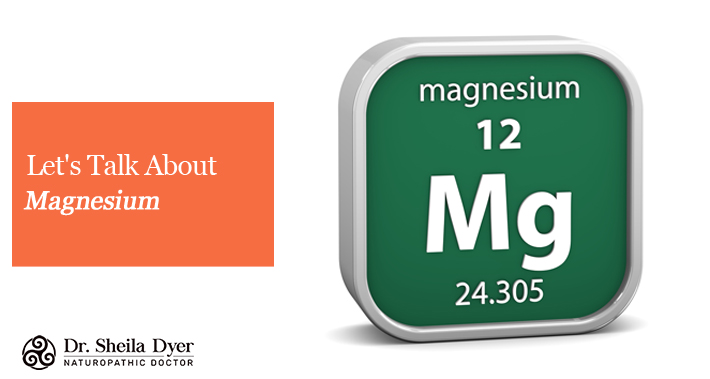We need many different vitamins and minerals to function at our best.
These nutrients can be taken from food or from supplements, and help support some of the most essential systems in our bodies.
One such nutrient necessary for good health is magnesium.
Magnesium is the fourth most plentiful mineral in our bodies.
It’s easily found in many different foods that you likely eat all the time.
But it’s also linked with stress.
I’m Dr. Sheila Dyer, a naturopathic doctor in Toronto, and if you’re having trouble dealing with stress, I can help.
As a naturopath for nutrition and stress near me, I often recommend magnesium for my clients.
So what is magnesium, and what does it do for you?
How do you know whether you’re getting enough of it?
And how do you get it?
Let’s find out.
What Is Magnesium?
Magnesium is a mineral that your body needs to function properly.
It helps more than 300 enzymes to complete chemical reactions, such as regulating blood sugar and blood pressure.
It also supports metabolic functions in your body, as well as protein building and energy production.
An electrical conductor, magnesium helps to regulate your heartbeat and muscle contractions.
Magnesium is stored primarily in your bones, and in tissues around the body.
Health Benefits Of Magnesium
If you don’t get enough magnesium, it can cause health issues.
Your heart, muscles, and nervous system all rely on magnesium.
Let’s take a closer look at some of its benefits.
1. It’s A Potent Anti Inflammatory
Magnesium supports more than 700 enzyme processes in the body.
These enzyme processes do things like:
- Helping to break down scar tissue
- Helping prevent blood clots
- Helping keep your blood clean
- Supporting your liver
- And much more
One such enzyme is the proteolytic enzyme.
This helps your body heal and prevents inflammation when you’re injured.
Proteolytic enzymes work better when magnesium levels are adequate.
Studies found that proper levels of magnesium were associated with lower levels of inflammation in the body.
On the other hand, people with low levels of magnesium had increased inflammation.
Low levels of magnesium can cause increased levels of cytokines.
Cytokines can trigger an immune response when released.
It also increases your production of histamines, which cause allergy symptoms.
Inflammation in the body uses up existing magnesium.
Less magnesium causes more inflammation, and more inflammation requires more magnesium.
It’s a vicious cycle.
2. It’s Good For Your Heart
Having proper magnesium levels is associated with improved blood sugar, blood pressure, and cholesterol levels.
These factors all contribute to improved heart health.
On the other hand, magnesium deficiency can lead to high blood sugar and blood pressure.
These are both linked with heart disease.
3. It Can Help Manage Anxiety And Depression
Several studies have found a link between increased magnesium levels, and a decrease in depression and anxiety symptoms.
Magnesium helps with the function of pathways in your brain.
When they’re not working properly, they’re thought to contribute to mood disorders like anxiety and depression.
There’s some evidence that supplementing with magnesium can help improve mood disorder symptoms.
Magnesium deficiency may increase the effects of stress on the body, and stress can heighten anxiety symptoms.
RELATED: Naturopathic doctor for stress management and mental health near me
4. It Can Help You Sleep Better
Magnesium can be a useful sleep aid.
This is because increasing magnesium levels can help your brain and body relax.
Evidence shows that magnesium can help improve sleep quality and duration.
It can even shorten the amount of time it takes to fall asleep.
It regulates melatonin in the body, the hormone that controls the sleep wake cycle, and induces sleep.
Magnesium also binds to a neurotransmitter that helps to calm the nervous system, preparing the body for rest.
Not only can magnesium make it easier to fall asleep, but it may make it easier to stay asleep, and have more restful sleep.
By blocking the binding of excitable molecules with neurons and keeping the nervous system relaxed, magnesium may help you get better quality sleep, and for longer.
RELATED: The Ultimate Guide To Optimal Sleep
RELATED: Naturopath For Hormone Imbalance In Toronto
5. It Helps Regulate Blood Sugar
Magnesium supports the function of enzymes that regulate blood sugar and insulin.
Studies have found that people with type 2 diabetes tend to have lower magnesium.
We also know people with adequate magnesium intake are at lower risk of developing type 2 diabetes.
This may be, in part, because high insulin or blood sugar levels can increase the amount of magnesium that gets flushed out when you urinate.
Increasing your magnesium consumption may help to improve insulin resistance, a condition in which your body can’t process insulin correctly.
Insulin helps to regulate blood sugar levels, so improving insulin resistance can help to also improve blood sugar levels in the body.
Improved blood sugar management is important for people with diabetes.
Signs Of Magnesium Deficiency
Though it’s pretty easy to get the magnesium you need through your diet, you may be getting less than the recommended amount.
However, few people have a true deficiency.
This is because your body can help to protect magnesium levels.
It does this by decreasing how much is flushed out through your urine, and increasing how much is absorbed by your gut.
A true magnesium deficiency is typically due to a long term situation affecting absorption.
This includes certain medications, alcohol misuse, or a low magnesium diet over a long period of time.
Signs of deficiency can include:
- Loss of appetite
- Abnormal heart rate
- Muscle cramps
- Seizures
- Chronic fatigue or weakness
- Nausea or vomiting
- Numbness or tingling in your skin
Dietary Sources Of Magnesium
Most people can get the magnesium they need through food sources, regardless of diet.
Some of the most potent sources of magnesium include:
- Salmon
- Halibut
- Soy products like edamame
- Black beans
- Almonds
- Cashews
- Avocados
- Peanuts and peanut butter
- Spinach
- Brown rice
- Bananas
- Dark chocolate (at least 70% cocoa)
Can You Overdose On Magnesium?
Because your body flushes excess magnesium out with your urine, it’s difficult to overdose just from food sources.
Supplementing is a different story, though.
If you take high doses of magnesium over a long period of time, you may end up with magnesium toxicity.
Signs of magnesium toxicity include:
- Flushed face
- Muscle weakness
- Low mood or depression
- Nausea or vomiting
- Low blood pressure
- Abnormal heartbeat
- Heart attack
If you have kidney disease, there is more risk for toxicity.
This is because your kidneys can’t properly remove your excess magnesium.
If you think you have magnesium toxicity, seek emergency medical attention as soon as possible.
Book Your Appointment With Dr. Sheila Dyer, ND, Today
Magnesium has a lot of wonderful benefits.
It helps your body to operate at its best, and supports some essential systems.
But if you’re not getting enough, it can cause health issues.
If you’re wondering whether magnesium supplementing is right for you, book your appointment with me, Dr. Sheila Dyer, ND, today.
If you have questions about naturopathic medicine, or would like to start with your first consultation, contact me, and let’s book an appointment.
Dr. Sheila Dyer, ND1080 Dovercourt Rd,
Toronto, ON M6H 2X8
(416) 554-5135
► https://g.page/DrSheilaDyerNd
Dr. Sheila Dyer is a Naturopathic Doctor and a practicing registered nurse offering holistic healthcare with a scientific focus

